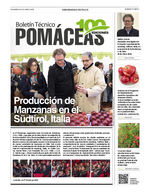Producción de Manzanas en el Südtirol, Italia
VarietiesThe pomology working group of the Laimburg Research Centre evaluates interesting new varieties from around the world to determine whether they are suitable for cultivation in South Tyrol – with a special focus on fruit quality and favorable tree characteristics. Currently, there are 120 hybrids, 40 red fleshed cvs, 75 resistant cvs and different mutants under evaluation. In its own breeding programme, Laimburg Research Centre aims to develop new varieties with characteristics that meet the demands of consumers and the market, with the use of new methods including molecular biology procedures to shorten the breeding process.
Although there is a lot of excitement around the topic of new varieties the previews show that even in 10 years the leading varieties in the apple world will be Golden Delicious, Red Delicious, Gala, Fuji, Idared, Jonagold, Granny Smith and Braeburn. Those varieties were discovered as chance seedlings or bred decades if not centuries ago and they were introduced without a defined marketing strategy. While they are free of royalties when it comes to fruit sells, some of their mutants are protected by plant breeder’s rights and therefore they can’t be freely propagated.
Rootstocks
Replant disease is experienced also in South Tyrol, because virgin land is very scares and therefore orchards are replanted on sites with a long history of cultivation of apple trees. The control option of soil fumigation is not allowed in the South Tyrolean IP system. Tolerance or genetic resistance of rootstocks would offer a more environmentally sustainable way of control. Furthermore, the most commonly used rootstock M9 is too weak for weak varieties like Red Delicious Spur and SQ159 Natyra® and too strong for Fuji, consequently inducing the risk of biennial bearing. M9 shows both burr knots and root suckers and is susceptible to fire blight and wooly apple aphid. Laimburg Research Center has a long tradition of rootstock testing, the ongoing trails have had a look, amongst others, at rootstocks coming from American, Russian, Polish, German, Czech, English, New Zealand and Italian rootstocks. Up to now the most promising rootstocks for the South Tyrolean pedoclimatic conditions and demands are G11 from the USA and AR295/6 from the UK. More years of evaluations are needed to get a more complete picture of the performance of those and other promising new rootstocks in testing.
Documents

|
Boletín Técnico Mayo 2018 () Boletín Técnico Pomaceas - Universidad de Talca |
Details
- Activity type
- Publication in technical journal
- Activity work package
- Performance of new fruit varieties
- Activity number
- Laimburg-WP2-A119
- Activity contact
- Walter Guerra
Laimburg Research Centre
Laimburg 6 - Pfatten
I-39040 Post Auer (BZ), Italy
[email protected] - Activity partner
- Laimburg Research Centre
- Activity country
- Italy
- Last edit
- 08-08-2018

The EUFRUIT thematic network has received funding from the
European Union's Horizon 2020 research and innovation programme
under grant agreement No 696337.
European Union's Horizon 2020 research and innovation programme
under grant agreement No 696337.